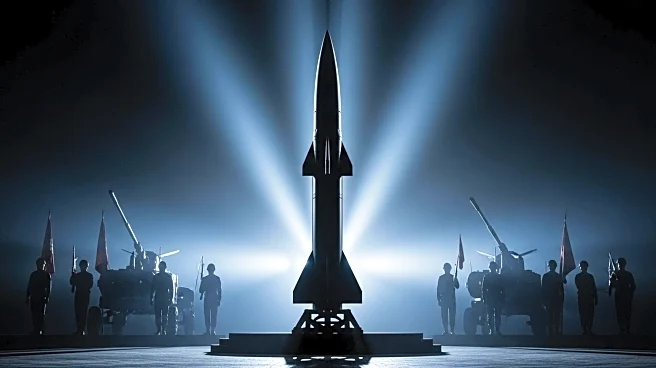What's Happening?
North Korea held a military parade in Pyongyang on October 10, 2025, to commemorate the 80th anniversary of the ruling Workers' Party of Korea. The event showcased North Korea's military prowess, including the display of a new intercontinental ballistic missile, the Hwasong-20, which is described as the country's most powerful nuclear strategic weapon system. The parade was attended by high-profile international figures, including Chinese Premier Li Qiang, former Russian President Dmitry Medvedev, and Vietnam's Communist Party chief To Lam. The presence of these officials underscores North Korea's growing diplomatic relations and military cooperation with these nations. The parade also featured columns of soldiers, including an 'invincible overseas operations unit,' which reportedly includes troops sent to Russia to support its military efforts against Ukraine.
Why It's Important?
The unveiling of the Hwasong-20 missile highlights North Korea's continued advancement in military technology and its strategic focus on expanding its arsenal. This development is significant as it reflects North Korea's intent to bolster its defense capabilities amidst ongoing geopolitical tensions. The attendance of senior officials from China, Russia, and Vietnam indicates strengthening military and diplomatic ties, which could shift regional power dynamics. North Korea's support for Russia in the Ukraine conflict further complicates international relations, potentially affecting U.S. foreign policy and security strategies in the region. The parade serves as a reminder of North Korea's persistent pursuit of military enhancement, which poses challenges to global non-proliferation efforts.
What's Next?
North Korea's demonstration of military strength may prompt reactions from the international community, particularly the United States and its allies, who may seek to address the implications of North Korea's growing capabilities. Diplomatic efforts to engage North Korea in disarmament talks could be influenced by its strengthened alliances with China and Russia. Additionally, the continued support for Russia's military actions in Ukraine may lead to further sanctions or diplomatic measures against North Korea. Observers will be watching for any subsequent missile tests or military exercises that could escalate tensions further.
Beyond the Headlines
The parade not only showcases North Korea's military advancements but also highlights the ethical and geopolitical complexities of its alliances. The involvement of North Korean troops in the Ukraine conflict raises questions about the ethical implications of such military support. Furthermore, the strengthening of ties with China and Russia could lead to a realignment of regional alliances, impacting long-term geopolitical stability. The event underscores the challenges faced by international bodies in addressing the proliferation of advanced weaponry and maintaining peace in volatile regions.











